| Barelds - Cycling around the world - Cycle stories - Asia, Africa, Europe, America | ||||||||||||||||||||
| home | site map | world | children | recent | cooking | dutch | german | react | ||||||||||||
Eastern Europe, Near East and Northern Africa (5).
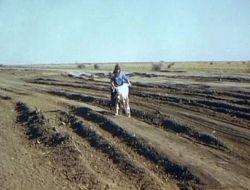
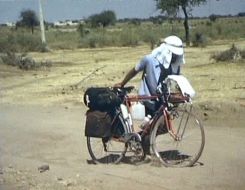
Sudan: When the mud had dried stone hard, you could cycle quite comfortably, but when it then changes into loose sand, it means pushing your bike (and you cannot longer call that cycling).
A
fter 2 months of non-cycling, the callus had worn off our hands, and they were very painful because of the bumps and rattling. But happy, and indescribably glad, we sat on our bicycles again!In the thin shadow of a thorn bush, the only vegetation far and wide, we spent our breaks by brewing tea, spreading our sandwiches and .............. repairing the punctures. Because, how do you get your bicycle unscathed from a place which is dotted with thorns? When we took a rest, those three things were always certain. On our way, with thorn bushes everywhere, you wished yourself massive tyres. We only repaired the punctures when inflating didn't help anymore, finding the punctures with saliva.
When you need 7 litres of water per day for drinking only, you cannot spare on the way, any water for repairing your tubes. In a rush hut near a village, they brought us, very helpful a bucket full of water. The people looked in amazement when Henny pulled the tube through the water: 20 punctures.
The lorry stops. The open trailer body is full of people standing. White shirts, white turbans, and white teeth in friendly laughing black faces. The driver hangs out of his cab "Everything OK" he shouts at us, "would you like to come with us?" "No thanks, we prefer to cycle" "do you have enough water?". We nod. "Massalaam". Friendly waving, leaving great dust clouds behind, they drive away. With every lorry, which overtakes us, 2 to 3 times a day, the scene recurs. All of them friendly, and always ready to help. In the few villages we travel through, people grasp their heads, flabbergasted, but always prepared to give water.
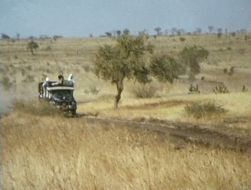
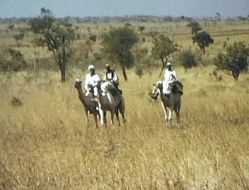
Sudan. Sometimes a lorry with enthusiastic people overtakes us, but also camel riders are helpful and point us the way.
This country so poor in goods, is the richest in helpfulness and hospitality.
Till Gedaref - approx. 500 km - the railway track was a kind of guide to us, and sometimes - our refuge when there was too much loose sand or washboard on the "road". Between the rails, with every 5 metres a "bump", was better and moreover we found shadow for a break when there was a culvert under the railway track. After Gedaref we deflected from the "main road", the normal border with Ethiopia at Kassala was closed because of the war in Eritrea.
The only thing left was a path through the scrubbush, uninhabited and lonely. A junction, which one to take.
Fortunately, there was someone walking, he pointed out to us the right way. We passed a few villages of round, straw, real African huts. "There is a fork in the road", someone warned us, "There you should keep right". At the third junction not a living soul to see, anywhere. We sat down for a rest, the last bites of dry bread was washed away with tea, when we heard cracking sounds, three camels came slowly swinging through the bushes. With many gestures we asked the riders the the way, which was indicated with the same number of elegant gestures, "Massalaam".
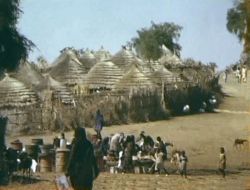
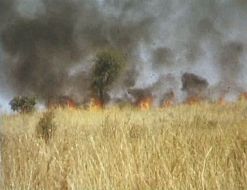
Sudan: Women at the village well, also here the same as everywhere, the place to exchange news. Large steppe fires to clear the dry grass and make the soil fertile again.
Smoke clouds, we already saw them from afar. Closer to the conflagration, the road ran straight through it. Steppe fires. "Moemkin?" we shouted to a man, who came from the smoke clouds. "Moemkin, moemkin", he grinned, you can, you can. You can go past it. Past scorched bare pieces, we cycled as fast as we could, looking out for already burnt areas where you could flee to if necessary.
The last day in Sudan, the hardest, a completely lonely area, an almost impassable path and far exceeding the estimated distances, we had run out of water hours ago, and at dark finally the border. A police station, but nothing could happen to us anymore now, we had made it.
Hospitable as always they offered us immediately large bowls of water, where this came from did not interest us now, one thing was important: thirst!
Pass control the next morning; the policeman looked at our passports, read the small arabic characters in our visa: "Issued on the condition that no cycling is done." he looked outside at our bicycles, looked at us, and put a stamp. "Massalaam."
| Start World around | Europe - North Africa | << Previous | Part 4 >> | |||
| Barelds on bicycle through the world - Cycling in Asia, Europe, Africa, America | ||||||